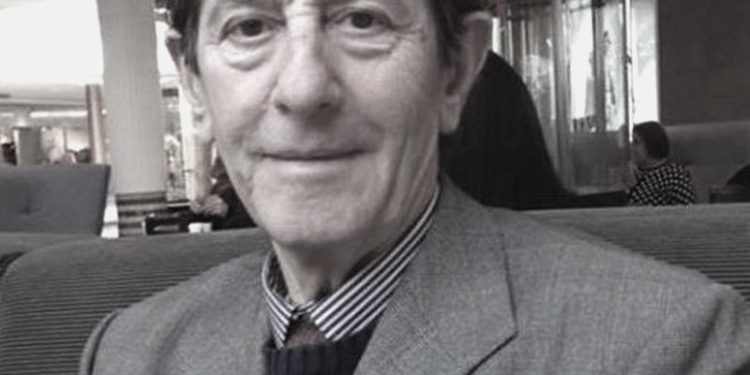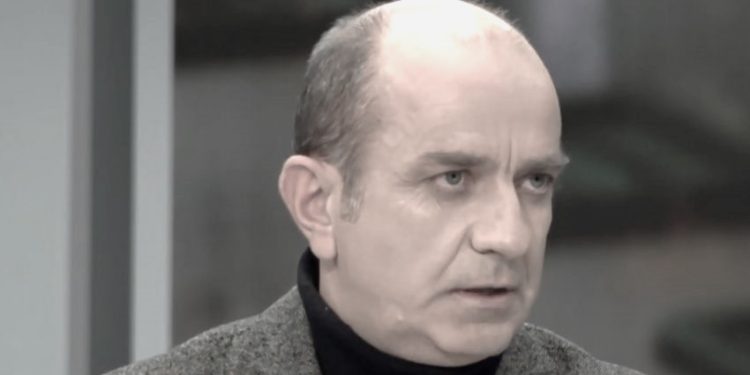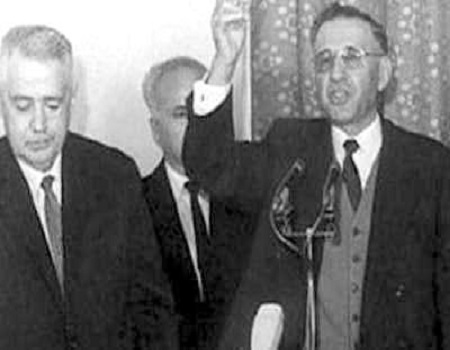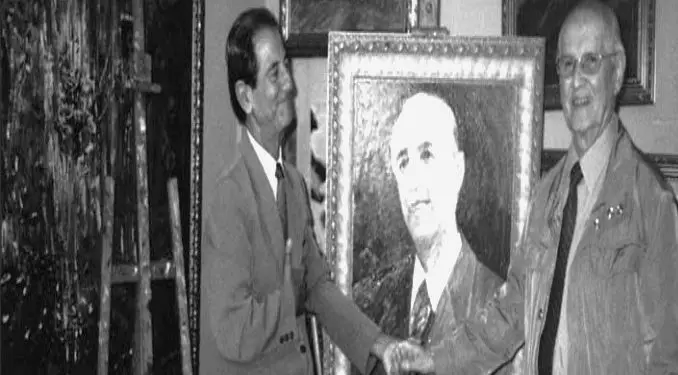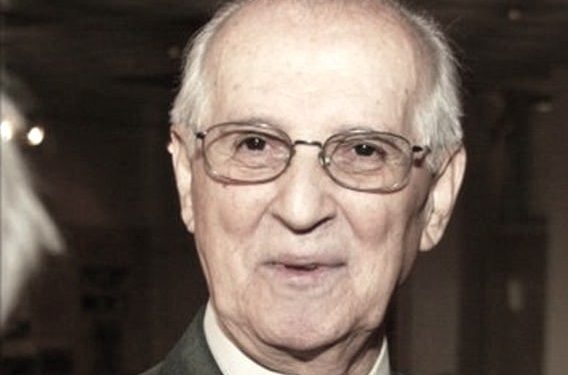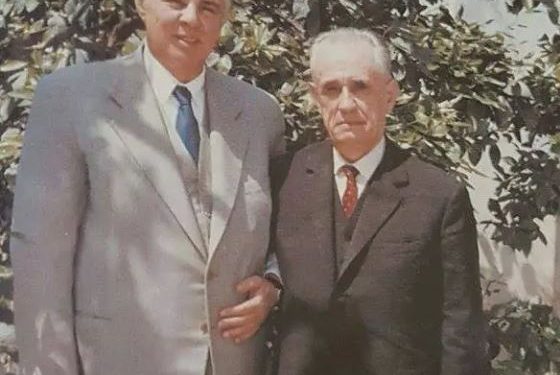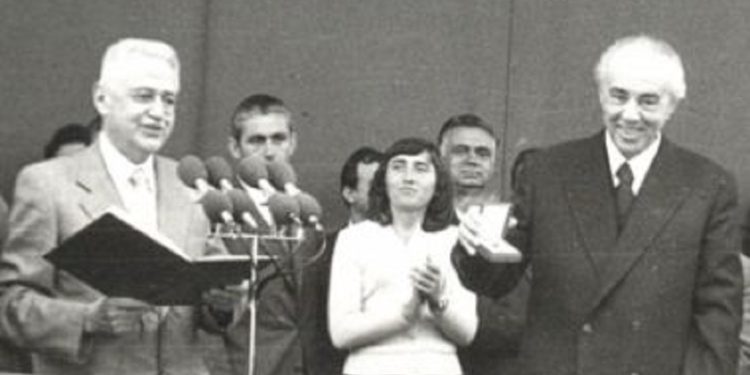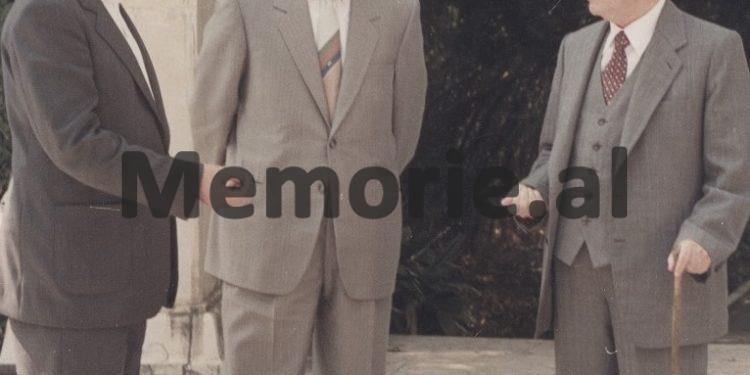By Aristir Lumezi
Part Two
Memorie.al / Ramiz Alia’s former personal secretary, Guro Zeneli, in a long interview sheds light on the communication of the former senior leader of the Party of Labor of Albania with Mikhail Gorbachev, regarding the strategy decided at the meeting of communist parties in Katowice, Poland. According to Zeneli, Ramiz Alia, once a student at the Faculty of Philosophy in Moscow with Gorbachev, although he was invited to participate in this meeting, did not go, but he was sent to Tirana the material of this meeting and the decisions taken there. Zeneli, who was close to Ramiz Ali until the last moments of his life, says that after Ramiz was introduced to Gorbachev’s document, he discussed it with Foto Çami and began a deep reflection based on it, softening the class struggle, the accusations against religion, the lack of defense of Stalin’s figure and discussing more openly about the market economy.
Continued from the previous issue
Mr. Guro, after the Katowice recommendations, what happened, were these theses put forward for discussion?
Ramiz informed the Political Bureau and the senior leadership of the PPSh, but the conservative wing, Haxhi Lleshi, Shefqet Peçi, demanded that power not be relinquished, that we have taken power with blood and will defend it with blood, and that the dictatorship of the proletariat should rule, that Albania should walk on the path of Enver. But Ramiz replied: “If we were to have violence and terror, what would you say, if among those who would be killed, your daughter was, how you would feel?! They are also mothers’ children! If we have to keep our power with violence, this will lead to bloodshed”. Here Ramiz dealt the party’s conservatives the first blow, because this argument stumped them.
After that Bureau meeting, Ramiz came to the office upset and said to me: “More Guro, you have no idea what kind of people I am dealing with”! The absurdity of the conservatives reached such a point that when Ramiz was president, he had left it to me as a duty to receive citizens and present the problems they raised to him. He had told me that in the Central Committee, we cannot receive all people. But you, as my secretary, will receive all categories of citizens in the presidium of the People’s Assembly. While the requests brought by the cadres in office, I would register them as problems and forward them to Ramiz, who would then deal with them himself.
What letters did you receive at that time that made an impression on you?
One of the letters that I will never forget was that of Liri Belishova, who at that time was interned in Cerrik. She asked to be left alone and to return to Tirana. This happened after the death of Liri’s daughter, a death that had deeply affected her spiritually. Zylyftar Ramiz and Hekuran Isai wanted to arrest Liri, as a supporter of Mehmet Shehu. In his book, “The Anglo-American Danger for Albania”, Enver described Liri Belishova as a collaborator of the Americans, along with Mehmet Shehu.
Based on this fact, these two wanted to arrest Liri. I don’t know how she had found out about the risk that she could be arrested and she sent a letter to Ramiz Ali. I took the letter and read it. There were two expressions that I still remember today: “I ask you to leave me alone in my black life! (because his daughter had died at that time); You, Ramiz, know how much I loved Mehmet Shehu and how much he loved me”!
Did she ask to meet with Ramiz?
No, no, she asked them to stop harassing her and to get her out of exile. After I read the letter to Ramiz, he said to me: “Guro, Mehmet neither loved us, nor did we love him”! For the sake of truth, Ramiz at that moment took Hekurani and said to him; what are these things you are doing?! Stop messing with Liria, the party has judged that man once and there is no need for us to judge him again! Don’t lay a hand on him!
How was Ramiz Alia able to manage the conservative wing in the party?
Ramiz had studied Philosophy in Moscow and knew the psychology of each one well. With the conservatives, he would find some weak point and block their reactions, as was the case when they asked him to use violence in 1990, if the people rose up. With that part that was more open and liberal, Ramiz spoke directly and in a different language. Ramiz made a very smart move, for the time. When Enver’s associations were formed, after the fall of the statue in Tirana, Ramiz called all the association leaders to his office and spoke to them very skillfully, to reduce tensions, because the country was at risk at that moment of civil war.
Ramiz, had he openly stated that socialism had failed as a system?
I will tell you a detail: Brzezhinsky, an American theorist of Polish origin, had published the book “The Great Winter”, which described socialism as a great winter. Ramiz wanted to read this book and ordered it. The book arrived, but it had to be translated.
In what year was this?
It must have been 1983-84. Ramiz called Taqo Zoto, who worked as director of ATSH, and asked him to translate it, but without making much noise. The book was translated and brought to Ramiz by confidential mail, so that only Ramiz could receive it. Ramiz told me that; “This book, Guro, speaks of our failure”.
It was the period when Strauss had approached Albania…?!
Yes, Strauss had come and Ramiz had expressed his desire for Albania to be connected with Germany and Switzerland. Ramiz had even put forward the thesis; “We are neither Easy nor West” and with this, he meant Switzerland. Albania established in those years, the direct line; Tirana-Zurich with “Swissair”, because until that time in Albania, only the Hungarian airline “Malev” was operating. I traveled myself on the first trip of the establishment of “Swissair” Tirana-Zurich.
Why did Strauss’s proposals not work, what did Ramiz say at that time?
Enver Hoxha in 1984, said that; “…we must turn our eyes to West Germany”. In this spirit, Strauss’s arrival in Albania was also accepted. Our mistake was that he insisted on the war reparations, which Germany should give to Albania, as damaged by it and as part of the winning coalition, of the war. I know that Strauss, has expressed his agreement, that; Albania is entitled to war reparations, but he has expressed that; “What is the fault of our sons, now after 40 years that they have to pay for the madness of a Nazi.” According to him, Germany had no way of paying for them.
You say that Ramiz was more liberal, or more inclined to open the country, he also welcomed American journalists, while the USA was an enemy country. How was the story?
A well-known American journalist came to Tirana, long before diplomatic relations with the USA were established, I don’t remember well. He met with Ramiz Alina. This was reported on the television news and Albanian Television, in one of the last editions, at 10:00 PM, so as not to attract too much attention. Another American journalist also came and met with Ramiz. These meetings were not well received, since one of the American journalists had written badly about Enver. Criticism came from the Institute of Marxist-Leninist Studies, from people close to Nexhmije Hoxha. In addition, Ramiz had requested that the families of those who had fled be no longer interned. In 1983-84, as chairman of the People’s Assembly, he had requested that the State Security control over universities be lifted, and this was done.
All of these events took place long before Ramiz Ali’s meeting with intellectuals in August 1990. How was he prepared?
Ramiz made a list of those people who had expressed the need for change and invited them to a meeting, with the aim that the demand for pluralism and pluripartism would come from the country’s intelligentsia and not as a call from the crowds. But the fact was that that intelligentsia, the cream of the nation (including Ismail Kadare), academics and other writers were much pressured and could not, perhaps for fear of persecution, express them openly.
Even though Ramiz was teasing them to come out to the needs of the time, for pluralism and the creation of new parties, they, including Sali Berisha, still spoke as if they had nuts in their mouths. In that meeting, neither Sali nor Ismail spoke about openness and freedom of speech and politics. Ramiz returned to the office in anger, saying; “What are these people who talk up and down, I ask them to talk and they don’t talk about what they want and what should be done with the future of the country”?!
There is a moment in history, where after the flight of those thousands of Albanians who were holed up in Western embassies, on July 2, 1990, the Party of Labor of Tirana organized a large rally in the square, where Ramiz Alia was absent. Why was Ramiz afraid to go out to this rally?!
In fact, the exodus with the embassies was a big blow to the system because it was being shown that there was a way to escape abroad and that the foreign embassies had managed to organize an anti-system exodus. The Tirana Party Committee requested the organization of such a rally and Ramiz was not against it. But Ramiz did not agree to it being held. Spiro Dede, I and another friend went to Ramiz’s office and told him that this rally should not be held, because after 5 thousand citizens have fled abroad, there are 5 thousand families who are crying and we do not have to disturb this feeling and concern of theirs. He told us that; “Xhelil Gjoni insisted, while I told him that I will not go to this rally”.
Ramiz had asked Xhelil to take full responsibility for this rally. Ramiz consulted with us on whether or not he should go to this rally. The majority at this meeting, where I was also present, were in favor of him not going, since he was the head of state and that he should not take strong political positions, towards Western embassies, but also towards those who had fled abroad, through this exodus. Therefore, we suggested that; it would be better to represent the Tirana party. Ramiz had this opinion himself, and why had he asked for an opinion from us, because he was a very intelligent being…!
Was there a request for the use of weapons from the leaders of that time?
Hekurani Isai, Xhelil Gjoni and others were in favor of a strong hand in the use of force. Ramiz was categorically against the use of force. They demanded that the military be armed. Ramiz sent an order: “The rifles should be taken, but not a single bullet in the rifle”! That is why Ramiz, they have also described him as a traitor to Enver.
Ramiz held a meeting with the students in the Assembly, but also in the Student City and had given orders that we will not use force against them in any way. The leader of the student strike, Azem Hajdari, was also present at this meeting, as well as Sali Berisha and other student leaders. Saliu even praised Ramiz Alia’s role in meeting the students’ demands.
How was the moment when the crowd wanted to attack the ‘Block’ of the leadership, symbolically overthrowing the communist system? Did Ramiz Alia communicate with Neritan Ceka, to restrain the crowd of citizens?
Neritan did a very good job at that time. There was an incitement from foreign agencies to create a clash in Albania. America had spread the opinion that the South of Albania was communist and the North did not like the communist system, therefore the northerners should be supported. So it happened, the first American ambassador, Ryerson, supported Sali Berisha immensely, to the point of participating in the meetings of the Democratic Party. Neritan Ceka, a moderate and non-extremist man, along with two others, I think Arben Demeti, met Ramiz and he advised them that there was no need to create conflicts, to burn and devastate the country, that the buildings were not to blame. Neritan came out and diverted the crowd and avoided a certain clash, towards civil war. Ramiz highly appreciated this action.
Let’s stay with these developments, the student strike and pluralism, what role did Skënder Gjinushi, at that time Minister of Education, have?
Ramiz highly valued Skënder. It was Ramiz who made him a minister and he wanted Skënder to be part of the political developments in the country, also due to the fact that history was taking place in a student environment. I have the idea that even in the creation of the PSD, Skënder had strong consultation with Ramiz
What was Ramiz Ali’s relationship with Sali Berisha like during the days of the student strike, or did they know each other and meet before?
No, they did not know each other. Ramiz, after learning that the student strike was led by people from Tropoja of the Student City, asked Xhelil Gjoni to find party people from Tropoja to go and talk to them. To establish a bridge of communication with people from the same circle, where family ties could be found. Ramiz wanted at all costs to avoid a violent clash between the students and the police and the army, he wanted to avoid a civil clash. Xhelil found Saliu and asked him to go and talk to the students on hunger strike on Ramiz Ali’s instructions. After taking over the mediation with the students, Ramiz told Xhelil Gjoni to take Saliu home to meet him. And so it was, Xhelil took Saliu to Ramiz’s house and they talked together. But Ramiz told me: “These Tropojëns are deceitful, they lie and play with two goals!”.
What was discussed at that meeting?
What I know is a request from Ramiz to meet the students himself. But Saliu did not want Ramiz to meet them, but to entrust him with this communication, giving guarantees that things would calm down. Here, Ramiz doubted Berisha’s sincerity, because he wanted to turn this situation in his personal favor. But Ramiz insisted on a meeting with the students and went to the “Student City” himself to talk to them, where he asked them to end the strike and return to classes, while the government would take all measures to meet their economic demands. In that meeting, Saliu expressed high regard for President Ramiz Alia.
During those days of the strike, were there other meetings between Ramiz and Berisha, perhaps secret ones?
Maybe there were, but from Ramiz’s mouth about Saliu, I heard the words: “He is a cheater, he is not honest”! Ramiz looked at the issues of the class struggle, with more liberal eyes. Let me tell you a story. When Ramiz was in the Presidency, Rita Marko wanted to dismiss a talented engineer from Gjirokastra, Gëzim Kallfë, who worked in the Presidency administration, because his grandmother had come from Cologne, with a bad political background. Another girl, Arjana, who was from Vlora, had a grandfather with the National Front and a partisan father. Rita wanted to dismiss both of them from their jobs, because of their bad biographies. Both of them come to me and tell me that they are going to dismiss us.
What position did Rita Marko hold at that time?
He was the deputy speaker of the People’s Assembly. I go and tell Ramiz, the concern that the two administration employees had about Rita, because of the biography of their grandparents. When he heard it, Ramiz told me: “Well, this Rita, she still remained during the war….”!
It has been repeatedly said that Ramiz Ali has been attempted to assassinate in the North of the country. What was the real story?
After taking office as the chairman of the Presidium of the People’s Assembly, Ramiz made a tour of meetings, from Konispol to Tropoja. I went to all the meetings. I was traveling in the vanguard car, together with Gëzim Kallfa. Upon arriving in Has, Vaskë Gaspari, Ramiz’s first officer, who was traveling in our car, before Ramiz’s, got out first and stopped his car. He had just received information from the Tropoja Internal Affairs Branch that a group of young people were preparing to carry out an assassination attempt on Ramiz. The information was that a young man with a grenade had been caught in the crowd of people who had come out to meet Ramiz.
Vaska did not allow Ramiz to get out of the car, and even asked to cancel the visit. But Ramiz insisted that his visit continue. He told Vaska that you take your measures, but I will continue with my program. To get through this situation, Ramiz began his visit to Has, going to the house of a Hasian martyr, to whom he would go later according to the program. The person who had the grenade was arrested and tried by the Supreme Court, being sentenced to execution. He was Skënder Haluca. The Supreme Court brought the decision to shoot Haluca to the Presidium of the People’s Assembly.
Did Ramiz Alia, as chairman of the Presidium of the People’s Assembly, sign Haluca’s execution?
Ramiz insisted and said that this man should not be shot, because this has to do with my person. Even though I am the chairman of the Presidium of the People’s Assembly and my life was in danger, I do not accept that anyone should be shot, because he was risking my life. Even though there were strong reactions that Haluca should be shot, in the end it was accepted that he should serve a prison sentence, sparing his life. He escaped being shot. Skënder after the change of system, during the time of the Democratic Party, became a judge and established himself in this profession. In the trial against the bureaucrats, Saliu appointed Skënder Haluca to judge Ramiz. But Haluca appeared before the court and said; I cannot judge Ramiz Ali, because he spared my life. He proved to be a man of great character.
The arrest of Ramiz Ali thinks that it was part of the Katowice scenario, where from the accusations of communist genocide, which were made to the communist leadership and for the murders of young people who crossed the border or, for those for free expression, Ramiz and the others, were convicted of financial embezzlement in their receptions and cafes?!
I don’t know if it was such a thing. But Ramiz has said that Saliu did not turn out as he expected. Ramiz has personally told me that: “Saliu is not honest with me; he is playing with two goals”. Saliu was known as a devout party man. When the student protests started and it was learned that their leaders were from Tropoja, and then we set in motion to find communists from Tropoja, to talk to them to alleviate the situation. Ramiz did not want a confrontation in any way and because the information was that foreign services were preparing such a thing, through these protests that would include the people of Tirana.
Later Ramiz Alia was arrested, when Sali Berisha was President and was imprisoned, what did Ramiz say about this period?
Ramiz was imprisoned when Berisha came to power and Ramiz’s words about Saliu in the 1990s were proven true. Ramiz did not speak, but there was a painful silence.
What did Ramiz say about his time in prison after he was released?
He often avoided talking about his time in prison. But from time to time he would say: “These are not people”! /Memorie.al




